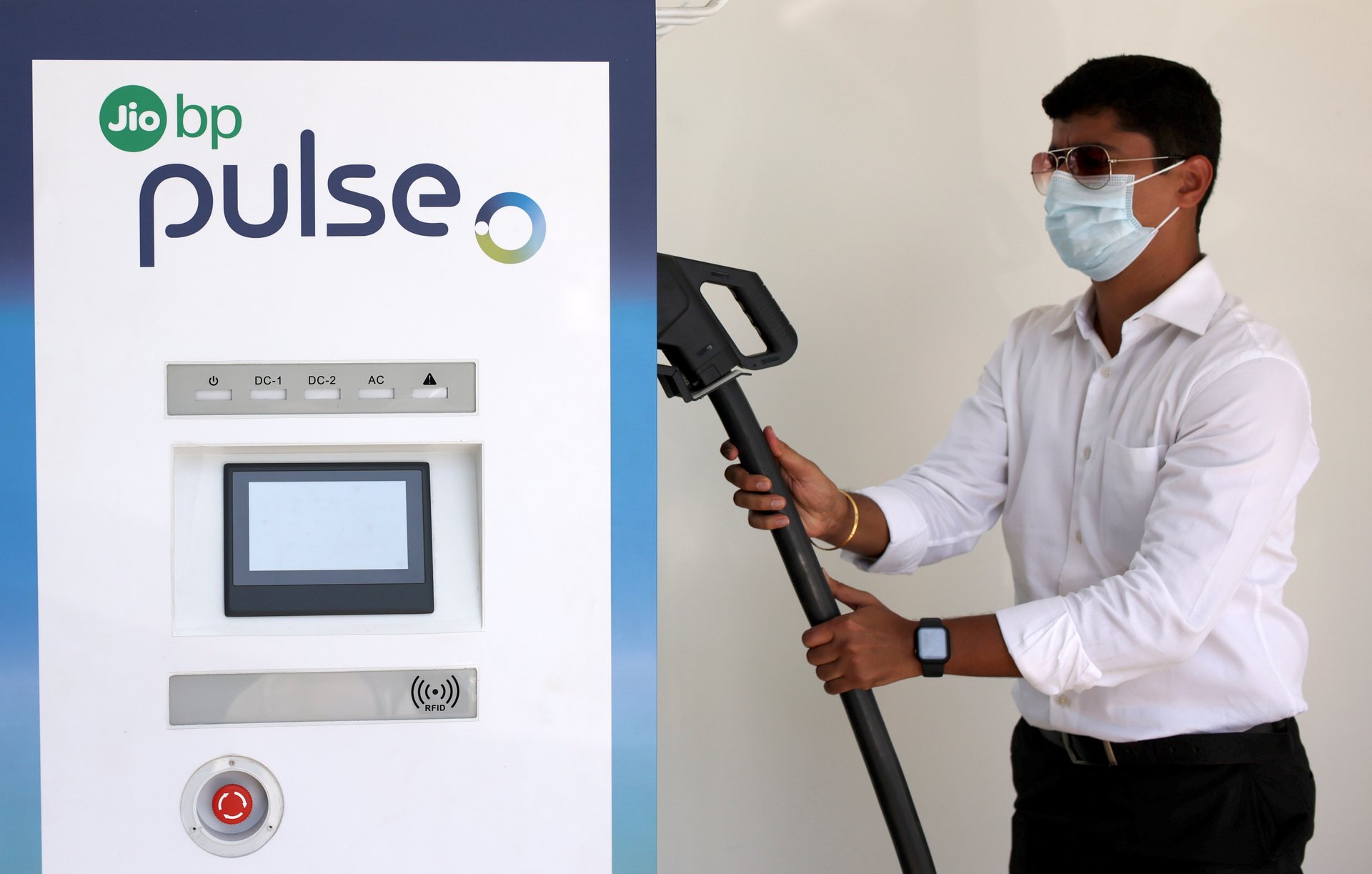In India, Chinese EVs aim to repeat the success of Chinese smartphones
BYD Auto, which dethroned Tesla as the world’s largest EV maker, has become the first Chinese firm to sell EVs in India

On Monday, (Oct. 31), BYD Auto, the Warren Buffet-backed Chinese electric vehicle firm, opened its first passenger vehicle showroom in Chennai. It was the first step in BYD’s bold ambitions for India: By 2030, BYD hopes to capture at least 40% of the Indian EV market.
BYD, which unseated Elon Musk’s Tesla as the world’s largest EV maker, is lighting the way for other Chinese manufacturers, who are targeting the nascent EV market in India, experts believe.
“With their own learnings in leading the EV revolution in China, Chinese firms will not only have an upper hand but [also] the resources to be able to be among the top players in India’s EV industry,” said Amit Gupta, the managing director of SAG Infotech, a Jaipur-based auto software firm.
Executives at several small and medium Indian EV manufacturers, who spoke to Quartz, felt a sense of deja vu.
“Chinese players are in a better position in a developing electric market than their Indian counterparts are,” said one executive working at a Maharastra-based electric two-wheeler firm, requesting anonymity. “The Chinese have already dealt with the EV affordability problem because of a wide home-based manufacturing ecosystem, something that gives them leverage in not just the smartphone sector but in various other industries as well.”
Chinese companies, they worried, may end up dominating the Indian EV sector, just as they currently dominate the smartphone market.
How Chinese companies flooded the Indian phone market
The Indian government has tried to boost homegrown phone manufacturers, but to little effect. Chinese devices, either imported into India or manufactured here, rule the smartphone market. Chinese brands make up 70% of the market, compared with a meager 1% for Indian brands.
As of late September, apart from Samsung, only Chinese companies figured among the top smartphone manufacturers in India.

Companies such as OnePlus, Oppo, and Vivo entered India in 2014 and quickly left behind their domestic competitors, making India the world’s second-largest smartphone market, behind the US.
The trajectory of these companies—from importing phones, to assembling them in India, to manufacturing them locally—offers a model for Chinese EV makers. At the moment, BYD imports parts into India and assembles the cars here, since taxes on imported completely built cars are high. But as the government rolls out incentives to make cars in India, Chinese firms will set up factories, thus getting into the driver’s seat of India’s EV revolution.
China is far ahead of India in the EV revolution
Well before India started considering EVs as a transport option, China had begun investing in the sector. In the last decade alone, China spent nearly $60 billion to create an EV ecosystem, while simultaneously reducing the number of licenses available for gasoline-powered cars.
As a result, more electric cars were sold in China in 2018 than in the rest of the world combined. In India, on the other hand, EV sales account for just 1% of total sales.
India aims to achieve an EV sales penetration of 40% for buses, 30% for private cars, 70% for commercial vehicles, and 80% for two- and three-wheelers by 2030.
Why India struggles to catch up with Chinese EV technology
Cost is the biggest hurdle for India’s burgeoning EV manufacturers.
An average electric car in India costs around $18,000, much higher than the average $6,900 for petrol and diesel cars. Likewise, electric two-wheelers cost between $965 and $1,724, compared to the $413-551 range of internal combustion engine bikes.
These price tags are high “for a couple of reasons,” Ashwini Tiwary, the CEO of Autobot India, a Pune-based EV tech firm, told Quartz over email. “One is due to the import of raw materials and the other is due to expensive batteries. If we can take care of both the elements by manufacturing both of them domestically then the pricing factor could be solved.”
India also needs better charging infrastructure and a nationwide network for swapping batteries, Gupta said. In EV parlance, battery swapping is the process of exchanging a discharged battery pack for a fully charged one.
China takes its first steps into India’s EV market
BYD has been operating in India since 2016, supplying batteries to an Indian company Olectra Greenwich, an electric bus manufacturing firm. Last month, it became the first Chinese company to announce plans to sell electric cars in India.
Several other Chinese EV companies, such as Better Power Company and Contemporary Amperex Technology, have ventured into battery manufacturing and swapping in India.
But such projects involve thorny processes, thanks to restrictions placed by the Indian government on Chinese investment. Earlier this year, for instance, the Chinese carmaker Great Wall Motor failed to win approvals for a $1 billion proposal to acquire and run a GM plant in Pune.
Despite these constraints, Chinese firms have prospered at the expense of their Indian counterparts. India still imports almost 70% of its lithium-ion cell requirements from China and Hong Kong. Indian firms are ramping up their manufacturing capacity, but they have a long way to go in order to catch up with their Chinese counterparts.